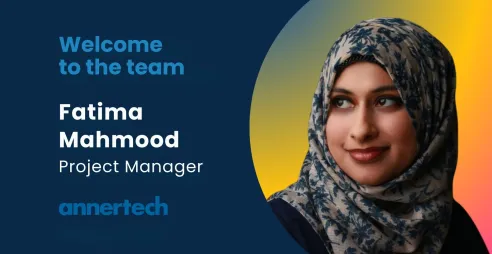Meet the Team: Mike King, Director of Delivery

Nailing down Mike King’s job description is not easy. He’s a director of Annertech. He’s also officially a project manager. He handles everything from overseeing client projects to digital transformation and strategy. Problem-solving is his thing. And he’s not scared of a challenge.
Alison: What do you actually do at Annertech?
Mike: My job title is very variable. I’ve been with Annertech for almost 10 years and my background has been a bit of everything. I like to have lots of different bits going on, different ideas and different areas to concentrate on. My focus at the moment includes consultancy, digital transformation and digital strategy.
I do some account management, where I look at strategic changes that clients require over the next three, six, 12 months. I’m currently managing three or four different projects that are being delivered for some of our larger clients. And I’m doing strategic consulting – there is a digital strategy piece that I’m completing with a client at the moment as well.
So I’m covering a lot of different areas. I’m also a director of Annertech, so there you go.
Alison: How did you get to this point in your career?
Mike: I started off in 1994 as a support engineer and then moved into the web very soon after that, in 1995. It was a time when there were very few structures around how it was done and it was like the Wild West – everybody did everything.
If you weren’t able to design graphics, write code and look after a server while also wrangle clients at the same time, you didn’t get very far. There wasn’t somewhere where you could specialise like there is these days.
Now you have a front-end engineer, who looks after the front end of the website, and the back-end people, who look after the deep technical part of the website. There was no such separation in those days. So I’m able to do it all.
In about the 2000s I swapped over to managing teams and projects rather than actually doing the technical stuff. I was still doing technical things but there was more weight around looking after people - from the client perspective and the team perspective. And that again has just grown and grown and grown.
In the mid noughties, I really started helping people to implement Agile practices and get teams to become Agile. Being Agile is all about finding better ways of developing software and working on projects by responding to change and finding solutions. I joined Annertech to help with the Agility aspect of it. And then got sucked into managing projects. And the rest, as they say, is history.

Alison: What makes a great project manager?
Mike: The term “project manager” is wildly overloaded. So when you say project manager you might not be thinking the same thing I’m thinking. I’m actually thinking “delivery manager”.
You get project managers who are actually project administrators and they look after keeping people together and keeping the things flowing. But I tend to think that at Annertech we are more “delivery managers”. And what I mean by that is that we are not just looking at saying “okay how’s progress”. We are digging down a bit further, going down to the next level, and trying to sort out how we are doing things, and whether we are doing things properly. So there’s a little bit of crossover with the Agile world, with a product manager.
With Agile you have a product manager and a scrum master. A product manager … they’re the person who has a vision and the end goal and they say okay well let’s make another little step towards the end goal and let’s define that step.
The scrum master and the team who work on the actual product itself give feedback to the product manager. They take guidance from the product manager on what should be delivered, but not how it should be delivered.
Project managers or delivery managers in Annertech live as the intersection of the Venn diagram of the product managers and scrum masters.
To be a good delivery manager you’ve got to be engaged with the client, the users and the team. You’ve got to have an understanding of how each of those three directions pull against one another. You can’t always give the team free rein to develop something that’s a really really brilliantly technical solution but it’s going to take forever to do. You have to weigh that off against the user needing something that’s simple off against the client needing the new users the data and something immediately and cheaply of course.
In my head the delivery manager can sit in there and judge which pull is the strongest and they’re going to need time for any particular feature - and be a good arbitrator.
Alison: So having said that, what sets the team at Annertech apart from any other team?
Mike: We are really open. We try to keep the structures flat. Everyone can contribute. People coming in from outside are in the best position to see something that doesn’t sit well. So we are open, we are inclusive and we are full of respect for one another. But that may not set us apart from other teams. What we try to engender within the teams is to keep people together.
So I’m not too worried about what sets us apart. It’s what keeps us together that’s more important to me. Attrition is a tricky thing. We don’t want to lose good people. But keeping them and keeping them involved is a great way to do it.
Alison: You’ve been there for a while. So have many other team members. I know there have been a lot of new faces lately but as far as staff turnover goes it seems to be a really good place to work. Is that the case?
Mike: Absolutely. There’s very low attrition. Very low staff turnover. And you’re absolutely right. We’ve seen a lot of new people in the past few months but that’s growth. There is obviously going to be people coming in and people going out but we’re in a growth phase at the moment.
Alison: What excites you about your job? Why are you still here?
Mike: I love solving problems and challenges and new toys; new things. But the challenges are probably the most rewarding and the most satisfying. We’re a service business, so we are presented with challenges and problems to solve every day. That’s our bread and butter.
Whether it’s a small problem or a large problem, there’s always a challenge that’s got to be overcome and working with people to overcome those problems and getting through them and being able to say “Yip, did that, great. Did we learn something new? Let’s do the next one”. I find this a very satisfying and rewarding aspect of the job.
Alison: If you had to think back, the 10 years or so that you’ve been with Annertech what’s the thing that you’ve been most proud of?
Mike: It wouldn’t be a particular project. It wouldn’t be something we’ve delivered. It would be the organisation that we’ve made, or built or created. You said yourself the attrition seems low and morale seems high and I’m proud that we’ve been able to do that. Having a good team of people and keeping them engaged is a big achievement from my perspective. There are individual things but I quite like the people side of this.
Alison: What are we looking like for the next five years for you personally and for Annertech?
Mike: Answering in five-year chunks makes it sound like I have a plan – it’s far, far from it. For Annertech… we’ve got loads of different paths we could take. We’re in a growth phase at the moment. Work is good. We’re doing well. For the next five years it would be great to keep that trajectory. To continue to do well. To continue to grow in a measured way and keep clients happy and the team happy.
For me? Not a clue. I’m quite happy to be buffeted by the rapids and sort of go where it takes me and learn new things and have new challenges.
Meet our other project managers

Meet the Team: Senior Project Manager Sean O'Connell

Meet the Team: Project Manager Emily McLaughlin

